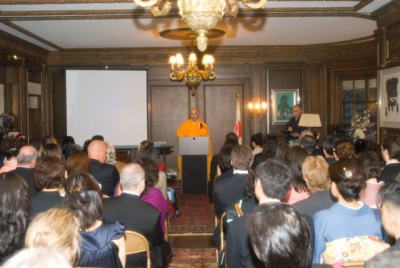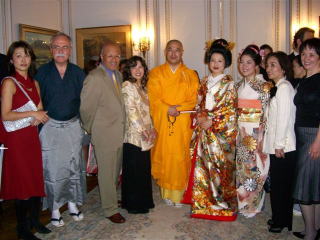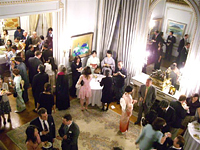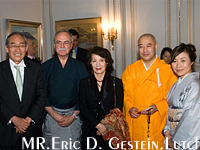 |
|
|
|
|
||
| |
|
|
|
|
||

INDEX
1.武士道 -日本の魂は米国にあり- 「和をもって尊しとなす」
2.Bushido-Japanese Spirit in the United States"Harmoney is to be valued
3.報告書
武士道 -日本の魂は米国にあり-
「和をもって尊しとなす」
日時: 2008年5月15日(木) 19:00~
会場: アメリカ 日本国総領事館大使公邸
皆様は武士道と言う言葉を聞かれたことがあるかと存じますが、この言葉の由来は明治44 年、初の日米交換教授としてアメリカ合衆国に赴き、後に国際連盟事務局次長となった農業経済学者であり教育家の国際人であった新渡戸稲造原作「武士道―日本の魂」(英文で書かれ世界的ベストセラー)のタイトル中にある武士道を意とします。
彼が渡米した頃の日本といえば、約400年に及ぶ封建的幕藩体制から刷新し、王政復興の維新改革をなし、明治政府という新秩序を構築した時期でありました が、中でもとくに米国との親日関係を築きあげた経緯には、新渡戸の功績が大きかったと言わざるを得ません。
何故ならば新渡戸は米国ジョンズ・ホプキンス大学での三年間日米の歴史を比較研究し、あまり知られておりませんが、日米関係史を出版しているのです。
新渡戸が何故、頑なまでに日米関係にこだわったのかは、彼の妻の影響があったと言われていますが、基督教新派の信者であった婦人の信仰に、彼はキリスト教と仏教との共通性を見出だしていたのです。
新渡戸は敬謙な仏教徒であり、釈迦晩年の教え法華経をよりどころとしておりました。
その彼が神の中に仏を、仏の中に神を感じたのではないでしょうか。
いわゆる彼は基督教にも仏教にもその根底には、他が為に生きる慈愛があり、米国の人々の心にも武士道の魂をみたのです。
新渡戸の故郷である盛岡(日本国岩手県)の城跡には彼の碑があり、その碑文にはこの様な言葉が書かれています。
“願わくはわれ太平洋の橋とならんと”。
次にもう一人武士道を貫いた人物をご紹介致します。
その人とは岡田資(たすく)太平洋戦争当時東海方面軍司令官であり、終戦後B級戦犯として死刑となった日本陸軍中将であります。
敗戦後、無差別爆撃を行った米国機搭乗員を処断したことが戦犯の容疑者となり、岡田は捕虜を処断した部下と共に法廷の被告席に座りました。
彼は横浜法廷に置いて国際法を用いて法戦し、また全ての責任は一切司令官たる自分が負うとして、その堂々たる態度と潔さ、更には日頃拘置所内での規律正し い生活態度の遵守や、同胞の部下達への温かい励ましの言葉だけでなく、GHQ監視官さえへも労いの言葉をかける人間性に、巣鴨プリズンの収監者はもとよ り、米国司法の裁判官や検事・弁護士・陪審員からも敬意と尊敬の念をもたれたのでした。
彼の背景には、駐英国大使館に武官としてロンドンに駐在した事が、国際感覚と国際法を身につけるきっかけとなったのです。
岡田は死刑に処されるその日の朝ゆっくりと歩きながら、若き収容者に言い聞かせたのでした。
“米国を兄とし日本は弟として未来永劫善き関係を築きあげて欲しい、そして未来は君達の慈愛にかかっている”と
ここに二人の偉人について述べさせて頂いた経緯には、共にアメリカ国とアメリカ人への尊厳を尊びながらも、義を貫いた一人の人間としての生き様を日米両国の人々が尊敬されたと言う事なのです。
またここで述べた義とは正義であり、正義とは他が為に己が生きんとする慈愛の精神に外ならないのです。
一般的に武士道と聞きますと真っ先に侍や切腹というイメージを抱きますが、それは武士道の一部形を形容したものであり本質ではありません。
真実の武士道とは先に述べました‘他が為に生きる’つまり正義の為には己の命さえ省みない犠牲的精神なのであります。
2001年、ここニューヨークで世界を震撼させる皆さまもよく周知の事件がございました。
あの9・11の出来事です。
メディアから流れる映像はなまなましく驚愕するものがございました。
しかし世界の人々はそこに人間の限りない愛の深さを垣間見たのでした。
それは我が命を犠牲にしながらも必死の思いで人命救助する尊き人々の無私の姿がそこにあったのです。
昨今我が祖国日本では年間37,000人の尊き命が自らのアクションで亡くなっており、世界一の自殺大国になりました。
また肉親同士の殺戮を始め、殺人事件が毎日の様に跋扈している有様なのです。
ところがあの事件が私を驚嘆させ一筋の人類の希望をみいだしてくれたのでした。
それは日本人が無くした大和(やまと=寛容の心)の魂、いわゆる武士道がここ米国にもあったことを…
仏陀はこのようなメッセージを残してくださいました。”人はただ愛に依ってのみ憎みを越えられる、憎みをもって憎みを越える事はできない。”「法句経第五より」
これよりマザー・テレサ愛の祈りをもって、私くしの話しを終了致します。
△このページのトップへ戻る

I believe many of you have heard the word ‘Bushi-Do’; this word is derived from the book entitled ‘Bushi-Do-Japanese Spirit’, which was written in English and was once a worldwide best seller. The original author of this book was Inazo Nitobe, who traveled to the United States in 1911 as the first Japan-U.S. exchange professor and later became an Undersecretary-General of the League of Nations. Inazo Nitobe was an internationally-minded educator and an agricultural economist at the same time.
At the time Nitobe visited the U.S., Japan had ended 400 years of the feudalistic Shogunate system and embarked on the restoration of the monarchy to establish a new order as the Meiji government in 1868. Nitobe especially deserves credit for the background of how Japan built up their pro-Japanese relationship with the United States. Nitobe researched and compared the history between the United States and Japan at Johns Hopkins University for three years. It is a little known fact that he actually published the history of Japan-U.S. relations.
It is said that it was Nitobe’s wife who had a significant impact on his commitment to the relationship between Japan and the United States. He discovered the common ground between Christianity and Buddhism in the faith of his Protestant wife. Nitobe himself was a pious Buddhist and he turned to Hoke Sutra for his inspiration, which is a teaching of Buddha’s later years. As the very person who had both the perspective of Buddhism and Christianity, Nitobe might have sensed Buddha in God and sensed God in Buddha as well. He saw the spirit of mercy, which is to devote oneself to other people, underlies not only Buddhism, but also Christianity, and he discovered the spirit of Bushi-Do in the hearts of the people in the United States.
In Inazo Nitobe’s hometown Morioka, Iwate prefecture of Japan, there is a monument of Nitobe at the site of an old castle with an inscription which reads, “Hopefully I shall be a bridge over the Pacific Ocean.”
Next I’d like to introduce another person who kept the faith in Bushi-Do. That person is a former lieutenant general of Japan, Tasuku Okada, who was a military commander of the Tokai region at the time of the Pacific War. Okada was put to death after the war as a Class B war criminal. He was suspected as a war criminal on a charge of executing a U.S. war plane crews for carrying out random bombings.
Okada was seated in the dock together with his men who had punished the captives. He contested in Yokohama court by using international law and declared that he was ready to take full responsibility as a commander. He was known for his well-balanced attitude towards life while imprisoned. His dignified and courageous manner and his humanity to speak encouraging words of appreciation to the surveillance agent of general headquarters, as well as the fellow men, was deeply respected by many. Not only did the fellow men have deep respect for Okada, but the judge, prosecutor, lawyer and jury of the U.S. judiciary as well.
Okada had once resided in London as a military attaché of the Japanese embassy. This very experience became the key, which opened the door to not only his keen interest in international affairs but international law as well.
On the morning of his execution, Okada reasoned with young inmates, walking with slow steps, “Regard the United States as a big brother and Japan as a younger brother, and build up a good relationship for eternity. The future depends on your love.”
While these two great men described here stuck to their justice, they respected the dignity of America and Americans. Each man’s way of life was highly honored by the people in Japan as well as by the people in the U.S. Justice is nothing more or less than the spirit of mercy and love, wanting to give your best to other people.
Generally speaking, when you hear the word ‘Bushi-Do’, the first thing that comes to your mind are such words as ‘samurai’ or ‘seppuku’; however, those words describe only the external forms of Bushi-Do, just a part of it, not expressing the essence of it. As I mentioned before, true Bushi-Do is a spirit of self-sacrifice that is to ‘live for other human beings’, sometimes even giving your own life for the justice.
As all of you know, in 2001 here in NY, there was an awful event which shook the entire world. That was 9-11. All streams of images from the media were extremely graphic and unspeakable. Nevertheless, people in the world got a glimpse of the deepest love, the unconditional love of human beings. There actually were noble human beings with supreme devotion, who were rescuing the other human lives desperately, even giving their own lives.
In recent years in my home country of Japan, there have been 30,000 people every year who have ended their precious lives in suicide, and this is one of the highest suicide rates in the world. Moreover, the miserable state is that murder is rampant almost every day, including killing among immediate family members. Despite these situations, it was that event, 9-11, which made me amazed and discover a ray of hope for mankind. It was a profound awareness that there lives so-called Bushi-do here in the United States as well, a spirit of Yamato (Yamato=charity), which Japanese people seem to have lost.
Buddha left a message for us, “You can overcome your hatred only by love. You can’t overcome your hatred by hatred.” (From: Hokku Sutra fifth) And now I’d like to conclude with “The Prayer of Love” by Mother Teresa.
 |
報告書 |
| 5/15(木)、日本国総領事館大使公邸にて、釈和尚の2回目のNY講演会が午後7時より行われた。厳重なセキュリティの中、この日のゲストは約110名で、NY
Timesを始めとするアメリカのメディアなど半分は外国人でした。
|
|
|
△このページのトップへ戻る
Copyright (C) 2012 syakusyorin.com All Rights Reserved.
| HOME | サイトポリシー | リンクについて | サイトマップ | お問い合わせ先 |
 ま
た、3大宗教の共通点、キリスト教は愛、イスラム教は慈愛、仏教は慈悲、この3つの"人を思いやる心"は同じだということを強調していた。真実の武士道と
は「他が為に生きる」つまり正義の為には己の命さえ省みない犠牲的精神を、2001年9月11日のテロ事件においても人命救助の中から、そして世界の人々
の中にも人間の限りない愛の深さを垣間見たという。それは日本人が無くした大和(やまと=寛容の心)の魂、いわゆる武士道がここ米国にもあったこと、仏陀
はそんなメッセージを残してくださったと説明した。「人はただ愛に依ってのみ憎みを越えられる、憎みをもって憎みを越える事はできない。法句経第五より」
ま
た、3大宗教の共通点、キリスト教は愛、イスラム教は慈愛、仏教は慈悲、この3つの"人を思いやる心"は同じだということを強調していた。真実の武士道と
は「他が為に生きる」つまり正義の為には己の命さえ省みない犠牲的精神を、2001年9月11日のテロ事件においても人命救助の中から、そして世界の人々
の中にも人間の限りない愛の深さを垣間見たという。それは日本人が無くした大和(やまと=寛容の心)の魂、いわゆる武士道がここ米国にもあったこと、仏陀
はそんなメッセージを残してくださったと説明した。「人はただ愛に依ってのみ憎みを越えられる、憎みをもって憎みを越える事はできない。法句経第五より」 最後は、会場の方全員に目を閉じてもらい、賛美歌をバックに釈和尚は、マザーテレサ愛の祈りを英語にて朗読すると、会場の中からはすすり泣く声がしていた。
講演では、必ずや瞑想の"無"になる時間を与えてくれ、心を和ませてくれる。講和が終わると、カクテルラウンジ会場へ移動し、大使公邸専属シェフによるお
料理の数々に舌鼓するゲスト。やはりお寿司は一番人気でした。最後は、着物クラブ企画による華やかな着物ファッションショーが行われ、打ち掛け姿まで登場
し、艶やかな着物はゲスト達の目を楽しませてくれた。 (記:星ゆき)
最後は、会場の方全員に目を閉じてもらい、賛美歌をバックに釈和尚は、マザーテレサ愛の祈りを英語にて朗読すると、会場の中からはすすり泣く声がしていた。
講演では、必ずや瞑想の"無"になる時間を与えてくれ、心を和ませてくれる。講和が終わると、カクテルラウンジ会場へ移動し、大使公邸専属シェフによるお
料理の数々に舌鼓するゲスト。やはりお寿司は一番人気でした。最後は、着物クラブ企画による華やかな着物ファッションショーが行われ、打ち掛け姿まで登場
し、艶やかな着物はゲスト達の目を楽しませてくれた。 (記:星ゆき)








